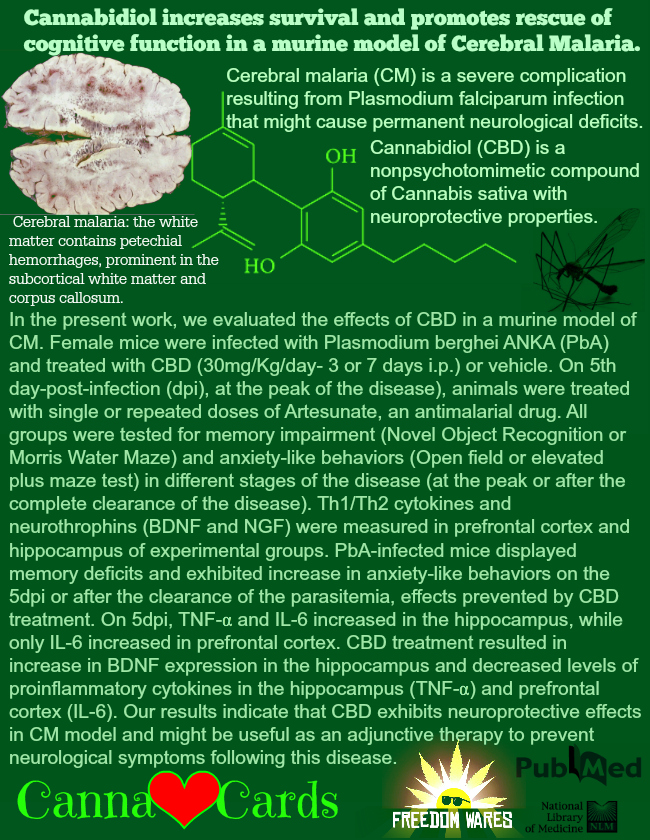2015 Jan 13. pii: S0306-4522(15)00019-6. doi: 10.1016/j.neuroscience.2014.12.051. [Epub ahead of print]
Abstract
 Cerebral malaria (CM) is a severe complication resulting from Plasmodium falciparum infection that might cause permanent neurological deficits. Cannabidiol (CBD) is a nonpsychotomimetic compound of Cannabis sativa with neuroprotective properties. In the present work, we evaluated the effects of CBD in a murine model of CM. Female mice were infected with Plasmodium berghei ANKA (PbA) and treated with CBD (30mg/Kg/day- 3 or 7 days i.p.) or vehicle. On 5th day-post-infection (dpi), at the peak of the disease), animals were treated with single or repeated doses of Artesunate, an antimalarial drug. All groups were tested for memory impairment (Novel Object Recognition or Morris Water Maze) and anxiety-like behaviors (Open field or elevated plus maze test) in different stages of the disease (at the peak or after the complete clearance of the disease). Th1/Th2 cytokines and neurothrophins (BDNF and NGF) were measured in prefrontal cortex and hippocampus of experimental groups. PbA-infected mice displayed memory deficits and exhibited increase in anxiety-like behaviors on the 5dpi or after the clearance of the parasitemia, effects prevented by CBD treatment. On 5dpi, TNF-α and IL-6 increased in the hippocampus, while only IL-6 increased in prefrontal cortex. CBD treatment resulted in increase in BDNF expression in the hippocampus and decreased levels of proinflammatory cytokines in the hippocampus (TNF-α) and prefrontal cortex (IL-6). Our results indicate that CBD exhibits neuroprotective effects in CM model and might be useful as an adjunctive therapy to prevent neurological symptoms following this disease.
Cerebral malaria (CM) is a severe complication resulting from Plasmodium falciparum infection that might cause permanent neurological deficits. Cannabidiol (CBD) is a nonpsychotomimetic compound of Cannabis sativa with neuroprotective properties. In the present work, we evaluated the effects of CBD in a murine model of CM. Female mice were infected with Plasmodium berghei ANKA (PbA) and treated with CBD (30mg/Kg/day- 3 or 7 days i.p.) or vehicle. On 5th day-post-infection (dpi), at the peak of the disease), animals were treated with single or repeated doses of Artesunate, an antimalarial drug. All groups were tested for memory impairment (Novel Object Recognition or Morris Water Maze) and anxiety-like behaviors (Open field or elevated plus maze test) in different stages of the disease (at the peak or after the complete clearance of the disease). Th1/Th2 cytokines and neurothrophins (BDNF and NGF) were measured in prefrontal cortex and hippocampus of experimental groups. PbA-infected mice displayed memory deficits and exhibited increase in anxiety-like behaviors on the 5dpi or after the clearance of the parasitemia, effects prevented by CBD treatment. On 5dpi, TNF-α and IL-6 increased in the hippocampus, while only IL-6 increased in prefrontal cortex. CBD treatment resulted in increase in BDNF expression in the hippocampus and decreased levels of proinflammatory cytokines in the hippocampus (TNF-α) and prefrontal cortex (IL-6). Our results indicate that CBD exhibits neuroprotective effects in CM model and might be useful as an adjunctive therapy to prevent neurological symptoms following this disease.Copyright © 2015. Published by Elsevier Ltd.
KEYWORDS:
Brain derived neurotrophic factor; Cannabidiol; Cerebral malaria; Cytokines; Inflammation


